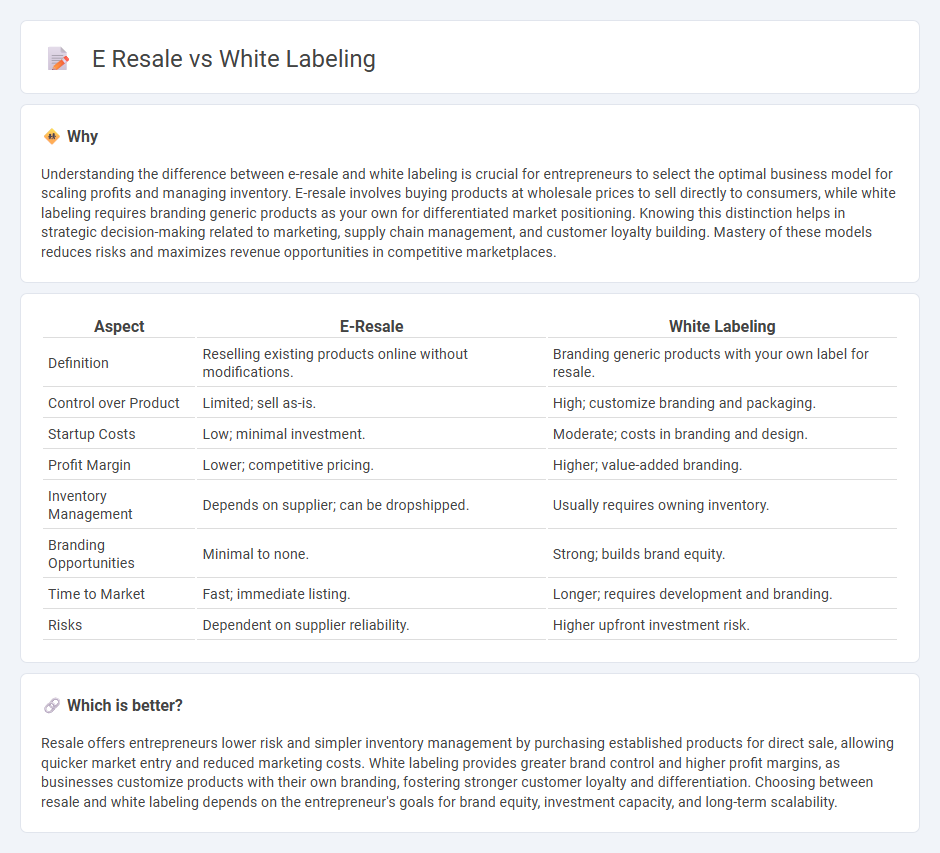
E-commerce entrepreneurs often choose between resale and white labeling to optimize their business models. Resale involves purchasing ready-made products and selling them directly to consumers, while white labeling allows entrepreneurs to brand generic products as their own, offering greater control over marketing and differentiation. Explore the key advantages and challenges of each strategy to find the best fit for your entrepreneurial goals.
Why it is important
Understanding the difference between e-resale and white labeling is crucial for entrepreneurs to select the optimal business model for scaling profits and managing inventory. E-resale involves buying products at wholesale prices to sell directly to consumers, while white labeling requires branding generic products as your own for differentiated market positioning. Knowing this distinction helps in strategic decision-making related to marketing, supply chain management, and customer loyalty building. Mastery of these models reduces risks and maximizes revenue opportunities in competitive marketplaces.
Comparison Table
| Aspect | E-Resale | White Labeling |
|---|---|---|
| Definition | Reselling existing products online without modifications. | Branding generic products with your own label for resale. |
| Control over Product | Limited; sell as-is. | High; customize branding and packaging. |
| Startup Costs | Low; minimal investment. | Moderate; costs in branding and design. |
| Profit Margin | Lower; competitive pricing. | Higher; value-added branding. |
| Inventory Management | Depends on supplier; can be dropshipped. | Usually requires owning inventory. |
| Branding Opportunities | Minimal to none. | Strong; builds brand equity. |
| Time to Market | Fast; immediate listing. | Longer; requires development and branding. |
| Risks | Dependent on supplier reliability. | Higher upfront investment risk. |
Which is better?
Resale offers entrepreneurs lower risk and simpler inventory management by purchasing established products for direct sale, allowing quicker market entry and reduced marketing costs. White labeling provides greater brand control and higher profit margins, as businesses customize products with their own branding, fostering stronger customer loyalty and differentiation. Choosing between resale and white labeling depends on the entrepreneur's goals for brand equity, investment capacity, and long-term scalability.
Connection
Resale and white labeling are connected through their roles in entrepreneurship by enabling businesses to quickly enter markets without developing original products. Resale involves purchasing products from manufacturers and selling them directly to consumers, while white labeling allows entrepreneurs to brand existing products as their own. Both models reduce product development costs and accelerate market entry, making them strategic approaches for startups and small businesses aiming for rapid scalability.
Key Terms
Branding
White labeling allows businesses to sell products under their own brand, creating a unique identity and building stronger customer loyalty by customizing packaging and marketing. E-resale involves selling existing branded products without altering the brand or packaging, limiting opportunities for brand differentiation. Explore in-depth strategies to decide which branding approach best suits your business goals.
Profit Margin
White labeling offers higher profit margins by allowing businesses to brand products as their own, reducing competition and increasing perceived value. E-resale often involves selling existing branded products at retail prices, resulting in slimmer margins due to direct competition and price sensitivity. Explore detailed strategies to maximize your profit margin in both models.
Supplier Relationship
White labeling involves suppliers producing generic products that retailers brand and sell under their own name, allowing for greater control over branding and customer experience. E-resale focuses on reselling existing branded products through online platforms, emphasizing efficient inventory management and supplier partnerships for consistent supply. Explore detailed strategies to optimize supplier relationships and maximize revenue in both white labeling and e-resale models.
Source and External Links
What Is White Labeling and What Are Its Benefits - White labeling is a business practice where one company uses another's product or service and applies its own branding, enabling quick market entry, cost reduction, enhanced brand recognition, and competitive advantage.
What is White Labeling and How Does It Work? - Squarespace - White labeling involves a manufacturer creating a generic product that businesses rebrand and market as their own, allowing expansion without product development.
White Label vs. Private Label: What's the Difference? | Burst - White labeling refers to generic products sold by multiple retailers with their own branding, commonly used in dropshipping where the retailer does not hold inventory.
 dowidth.com
dowidth.com